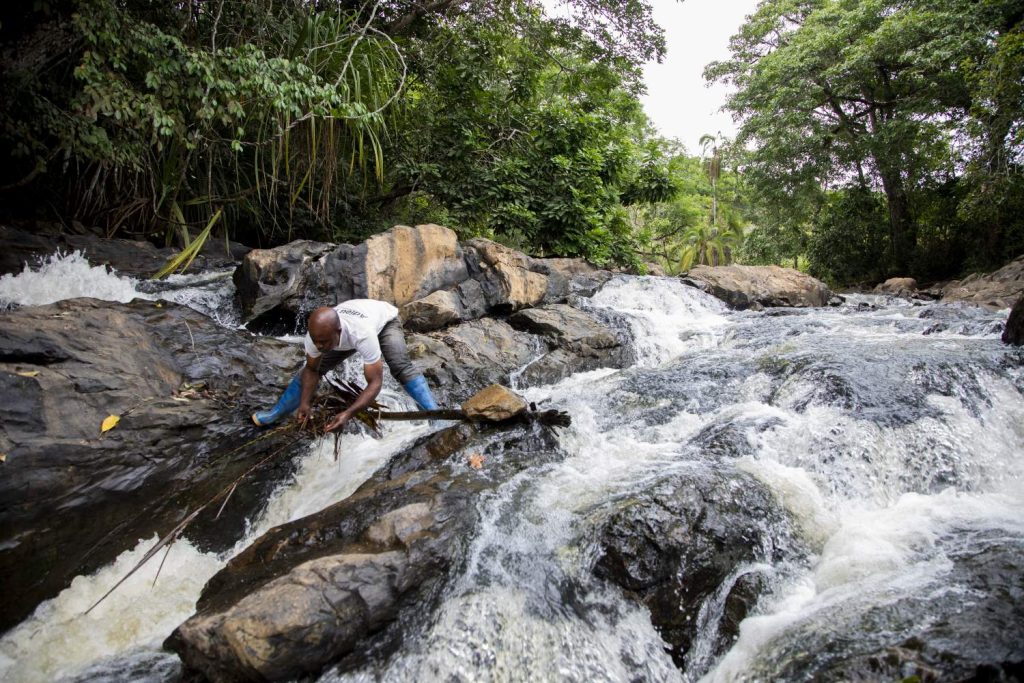
Local entomologist Njikam Soulé prospecting river Nja for larvae_Dominique Catton. Credit:Sightsavers
Co-Creating Climate-Resilient Health Futures: CHAIRR Workshop in Malawi
10–11 June 2025 | Salima, Malawi
This week, the Walker Institute and Sightsavers are convening a landmark workshop in Salima, Malawi, bringing together a diverse group of stakeholders to address one of the most pressing challenges of our time: the intersection of climate change and public health.
The two-day NTD Adaptation Planning Workshop is part of the Climate Health in Africa Integrated Risk Research (CHAIRR) project—a collaborative initiative between the Walker Institute at the University of Reading and Sightsavers, with support from Malawi’s Department of Climate Change and Meteorological Services (DCCMS).
Why This Workshop Matters
Climate change is reshaping the landscape of disease risk across Africa. In Malawi, rising temperatures, shifting rainfall patterns, and extreme weather events are influencing the spread of Neglected Tropical Diseases (NTDs)—a group of infections that disproportionately affect the most vulnerable communities.
The CHAIRR project aims to provide a fine-resolution understanding of these climate-health dynamics. Through Climate Risk and Vulnerability Assessments (CRVAs) and the development of ICICLEs (Inclusive Consultative Integrated Climate-Livelihood-Environment storylines), the project is equipping policymakers and practitioners with the tools to plan for a more resilient future.
What’s Happening at the Workshop?
Held on 10–11 June in Salima, the workshop is designed to:
- Share findings from the CHAIRR assessments across ten districts.
- Explore ICICLE storylines that illustrate plausible climate-health-livelihood futures.
- Co-develop “no regret” adaptation strategies for climate-sensitive NTDs.
- Build capacity through a “Training of Trainers” model to support long-term, locally led adaptation planning.
Participants include district government representatives, NTD coordinators, health and agriculture experts, and international adaptation stakeholders.
The Districts in Focus
The ten districts selected for CHAIRR span Malawi’s diverse geography and socio-economic contexts:
- Karonga & Chitipa – Northern highlands facing temperature and altitude-related risks.
- Nkhata Bay – Lakeshore communities vulnerable to water level changes.
- Mchinji & Lilongwe – Border and urban districts with complex health infrastructure needs.
- Dedza & Mangochi – Agricultural hubs with food security and waterborne disease concerns.
- Zomba & Blantyre – Urban-industrial and plateau regions with environmental health risks.
- Nsanje – Southern flood-prone district with high vulnerability.
From Insight to Action
The workshop uses interactive sessions and group work to guide participants through a structured planning process:
- Understanding climate-health risks.
- Setting district-level adaptation goals.
- Identifying viable adaptation options.
- Mapping action pathways.
- Drafting practical, locally owned action plans.
The outcomes will feed into national and district-level adaptation policies and help shape future funding and implementation strategies.
A Collaborative Future
This workshop is more than a meeting—it’s a step toward a more integrated, inclusive, and climate-resilient health system in Malawi. By combining cutting-edge science with local knowledge and leadership, CHAIRR is helping to ensure that no one is left behind in the face of climate change.
Stay tuned for updates and outcomes from the workshop—and follow the journey at walker.reading.ac.uk and sightsavers.org.

